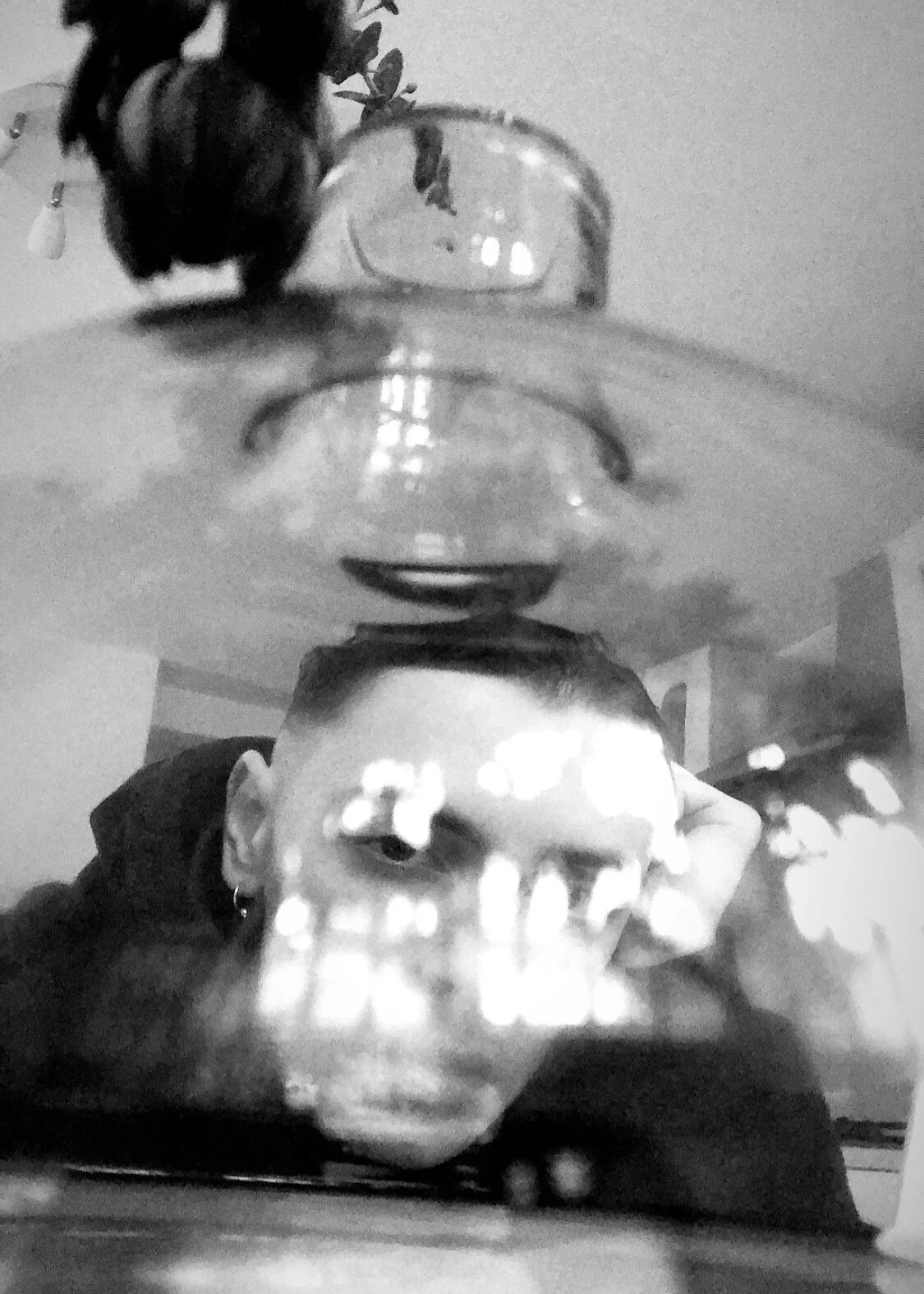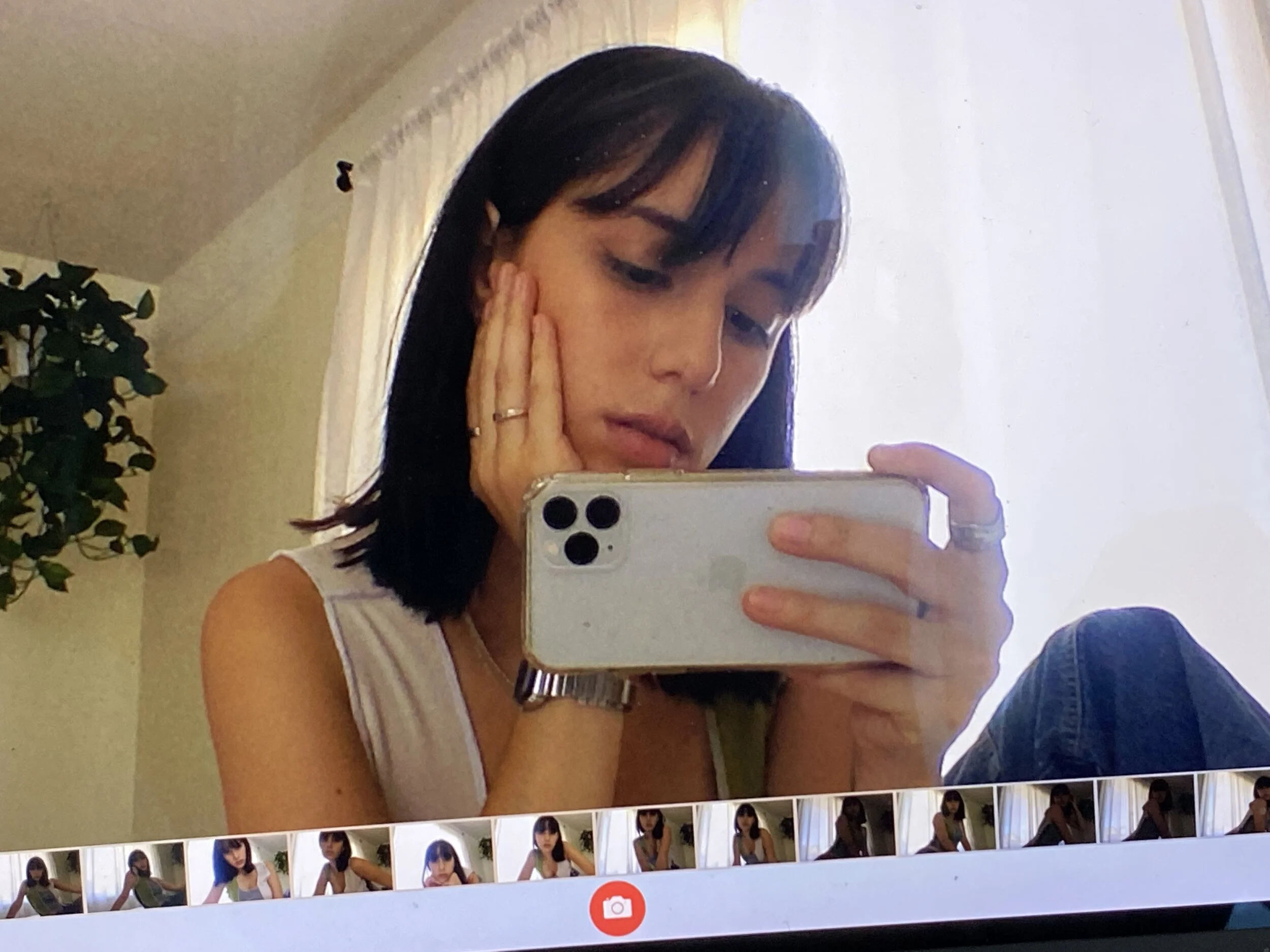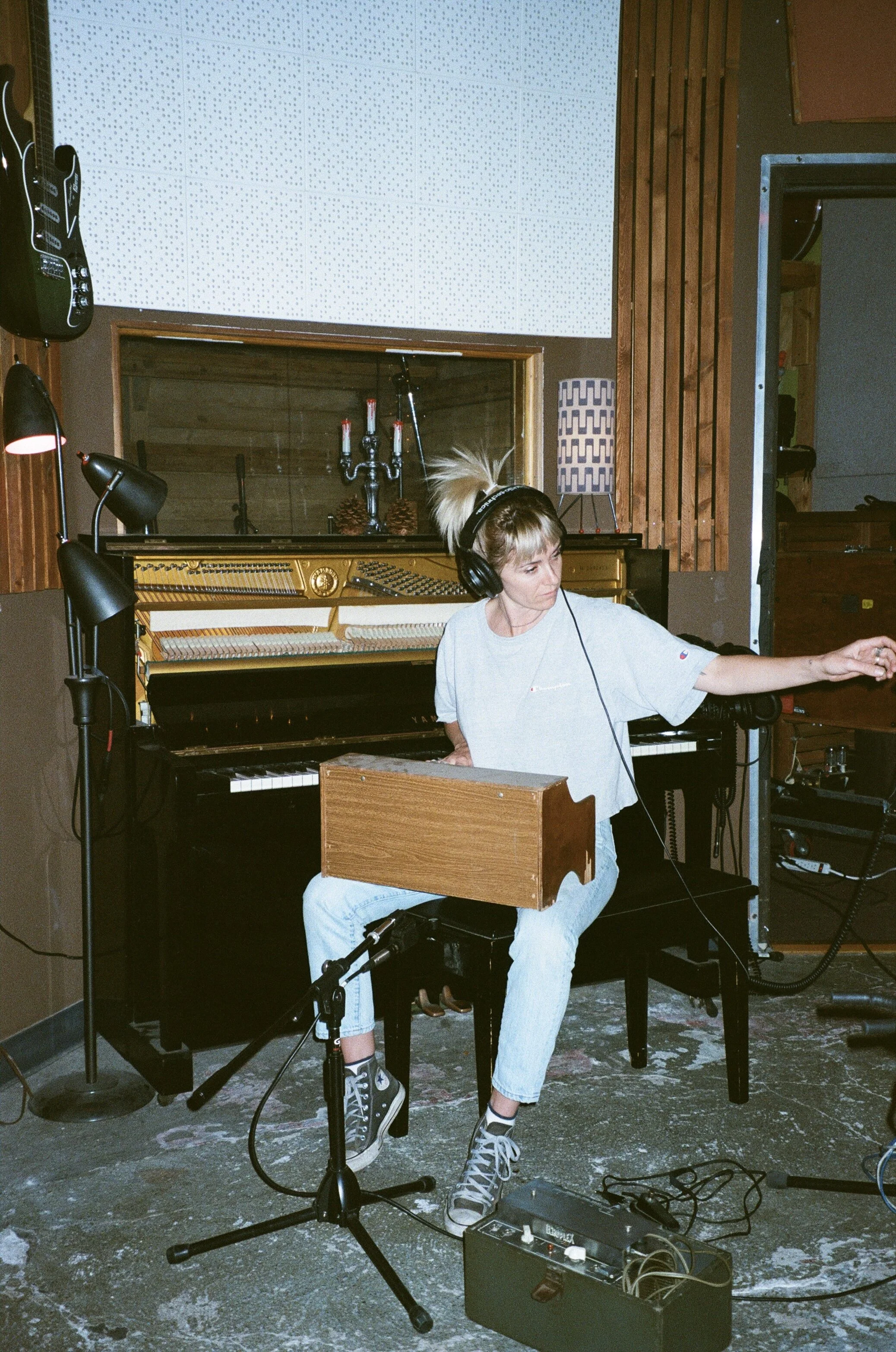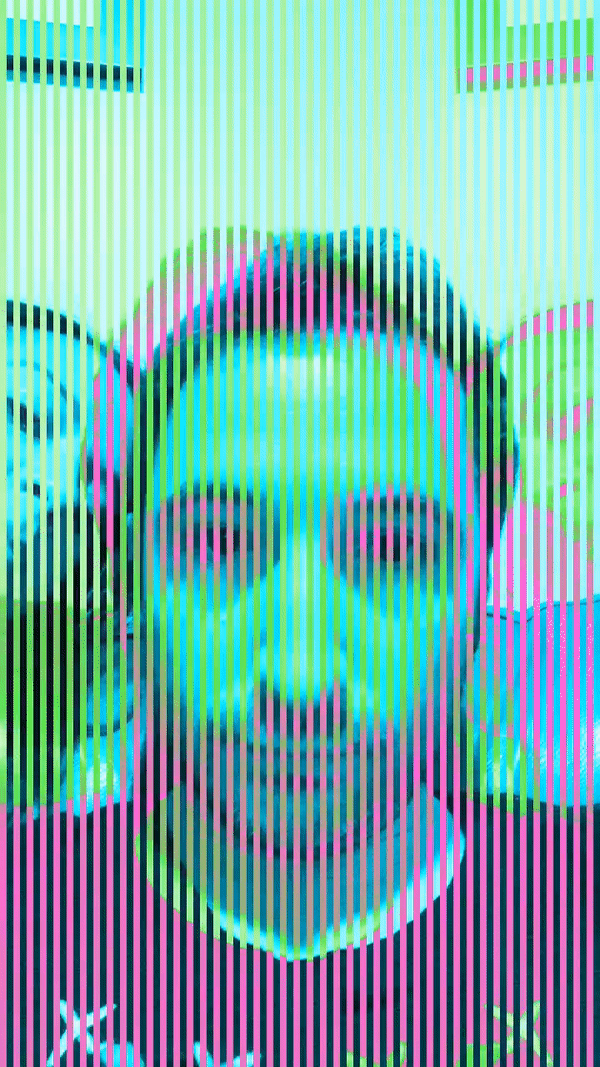Tmboy & Noah Prebish On Learning to Love the Process
written by noah prebish
photographed by alex bandoni
Sarah Aument and Will Shore first met as hired composers while working in New York. From there they became the electronic pop duo properly known as TMBOY. This past February they released their debut album Steam. Noah Prebish, Brooklyn based musician, producer, and DJ met Sarah and Will through The Lot Radio where they connected over their interest and excitement for dance music. TMBOY has performed in the past at Secret Friend, the immersive art and experimental music dance party that we co-host with Noah. This Saturday at Baby’s All Right for Secret Friend 006 they’ll be showing us a different side of their practice through an experimental DJ set. Going back to where they first met, the group chats at The Lot over synesthesia, experimentation, and working through your art.
Noah Prebish: First of all, do either of you have synesthesia? It’s going to come up later unless you say that you don't have it, in which case it won't come up later.
Will Shore: I wish I had it. But no, I don't.
Sarah Aument: I feel like someone told me a lie because someone said that I have some form of synesthesia if you get goosebumps when you listen to music, like tactile, but I don’t think that's true.
Noah: I think that just means you like music a lot.
Sarah: Well apparently that’s going extinct… Like not every person gets goosebumps when they listen to music, which was a huge shock to me because I thought everybody did, but not everybody does.
Noah: That's becoming less the case?
Sarah: Yeah, it's going extinct.
Will: Kind of like redheads are going extinct.
Noah: Redheads are going extinct? Really?
Sarah: We need to breed more you guys.
Noah: You guys aren't having as much sex or something? What's the deal?
Sarah: It’s recessive.
Will: It's just getting diluted… You need to have two redhead genes to make redheads.
Noah: So they’re just not having enough sex with eachother.
Sarah: Yeah, they're giving birth to brunettes and blondes.
Noah: Will, tell me about Sarah's immediate family.
Will: Uh, well she's got a sister that she's really close to. And her sister has a son that's about a year old maybe and his name is Will. So it's really easy for me to remember that.
Noah: He was named after you?
Will: Yes, after me (laughter). And then sometimes her mom and dad will show up in New York at a show or something. And she has an older brother who I met briefly in Vegas randomly because we all happened to be there at the same time.
Noah: That's pretty sick. All Right, Sarah, tell me about Will’s immediate family.
Sarah: Will comes from a small clan of four siblings, so he's got three. He has an identical twin named Andrew and an older sister, and an older brother. This oldest brother I haven't ever met and I kind of have this fantasy of never actually meeting him… Well, you know, I'll meet him, but they're all redheads. And um, I think my favorite thing is that your mom has an outdoor shower in Massachusetts and I've used it, so it's quite nice. I love an outdoor shower. Nothing like being nakey just looking out into the farm lands.
Noah: Will, tell me about Sarah's first kiss.
Sarah: Oh my gosh. I don't even think you know that.
Noah: Make up a story.
Will: I think Sarah probably had her first kiss when she was maybe thirteen.
Sarah: That's a good guess.
Will: There was some kid in her class, the guy who she thought, you know, he would be a good guy to have “my first kiss with.” Looking back at it, she felt like she thought she had no idea what she was doing.
Sarah: Yeah, definitely. You can still smell him. His Axe body spray. 2003.
Noah: Sarah, tell me about Will's first kiss.
Sarah: I feel like Will probably had like a girlfriend for like four years from like ages nine to like thirteen. And they had just been like friends who held hands for awhile and then you're at home watching a movie like um, like some movie that's not romantic at all, like the Matrix or something. And you guys were like holding hands and then at some point you were bored at the movie and just like laid a kiss on her lips.
Will: Exactly what happened.
Noah: Really?
Will: No (laughter).
Noah: The first movie I saw that the girlfriend was Norbit. That’s the one where Eddie Murphy plays every character in the movie… Not a romantic movie at all. Very, very awkward to watch with, with a fledgling relationship.
Sarah: I saw the movie Holes and my mom came with me and this boy. She sat like two rows back. Also it was like a Shia Lebouf movie made for twelve year olds
Noah: Dude, great movie.
Sarah: Sigourney Weaver is in it, just saying.
Noah: I think that concludes the warm up portion of our interview, which is honestly probably most of the interview. But I think it's important that we're at an open and mindful place and we discuss things like music because it is not trite, but sometimes it can feel very trite to do interviews about singles and things. So now we can move into this part in a very honest and mindful fashion. What does the new song mean to both of you?
Sarah: “The Light” is the most feel good song on the record, I think personally. It feels really easy to digest and feel sort of pleasure from in a joyful way. I remember we wrote it a little differently than we did most of the record. And usually we collaborate a lot on chord progressions and basic song structure. And then we kind of do our own thing. Will is making sure that the kick has a perfect low end, and I'm deciding what the lyrics or the verses are or something like that. But for this one, Will kind of built out a verse, it was just like a nondescript instrumental, and it made me feel like somebody had draped me with this, this like really warm blanket that also made me feel happy.
And so I wanted to put myself into a place where I felt that and the world, and I sat down in this really hot day and in the sun, and I just kind of baked while I thought about the song and what I wanted to to say lyrically. So it's kind of like when you recharge and you know, you're totally in the moment and you can be happy and not worry about things and just sit there and enjoy it. That's kind of what the song is about. Trying desperately to remember and telling yourself, don't forget this.
Noah: That's lovely.
Will: That song for me on the record, it's kind of like a little window into the the future of our band and like where we're headed, like on the newer stuff that we're going to write. Partially, because the track gets into a lot of the dance music that we've been DJing, as well as listening to a ton over the past year, but then also still has the songwriting aspects really strong. And I think that the nice part about the track is that it's not like stuck to the song form. So it's still feels open ended, it kind of like changes and shifts throughout the whole thing. And I feel like it the future of Tmboy is kind of exploring some of those ideas, taking the structure out of the music and finding a new way to approach it.
Noah: Taking the structure out of the music… can you elaborate on that?
Will: So like taking away the standard like pre chorus, chorus, verse, chorus… like taking that out and like finding new ways into sections and making the music feel like instead of blocks of sections, more linear, like everything's connected and moving, kind of like dance music feels.
Sarah: Yeah, I mean if you break the song down, it's like “A” section then like in “A” prime section and then like a “B” section that never returns. And then a “C” section, um, after like an “A” prime… and then it comes back to the “A”, but it's not the same as it was in the beginning.
“So it’s kind of like when you recharge and you know, you’re totally in the moment and you can be happy and not worry about things and just sit there and enjoy it. That’s kind of what the song is about. Trying desperately to remember and telling yourself, don’t forget this.”
Noah: That's super interesting. I know that dance music and DJing plays a big role in your writing. What I was really drawn to first and foremost when I discovered your music was how rich it is in terms of timbre. It's exciting to have stuff that compositionally has a lot of integrity and really can hold water. But I also just get really excited about the shapes of the sounds that are in your music. We have a shared love of kind of minimal house and techno and short percussive sounds, and can hear references to that in your work. Were there any sort of like specific reference points, like specific tracks that you were thinking about when you were working on the production of this song?
Will: I think we definitely nerd out over it sounds that we hear from records. So like we'll be listening to like Via Lobos minimal track and just talk for like ten minutes about the sound of the rim sound on the snare. So I think we're more so now than before we're drawing like inspiration from our DJ sets. Before we were approaching it a little bit more, uh, like, you know, song, like it's from a song perspective. We were basically sending music to each other every day, like sharing tracks as inspiration. I know that also I’ve gotten a lot of inspiration from like avant garde percussion music. So everything like from Xenakis and John Cage had a percussion ensemble and, uh, and it's really awesome combination of like, found and built instruments. And I like kind of including this, this kind of tambour indoor music where it's not just electronic, but it also has this live acoustic percussion sound.
Noah: It's really exciting when a band’s surroundings start to impact their compositions and their production. I've also felt my composition style changing a lot because of DJing. It makes you think about things differently and makes certain things make a lot more sense.
Will: Yeah, exactly. And also just hearing the music on like a big system changes the way that you want to create sounds so that they like translate well onto this bigger system.
Sarah: Yeah, definitely. I think that some of the sounds on this song in particular are such warm synth sounds and then the (vibraphone) plays a really big role in the plot. The vibes have this really lovely quality to them that feel like there's a little bit of of warping in the decay of the echo and delay. So it feels reminiscent of old film scores that we like a lot that have this dreamy quality to them, but also a little bizarre quality to them… And what I wanted to do was bring it down for a second and not sing at the top of my lungs like I do on the rest of the record... And kind of do something that felt calm and grounded in less of an emphatic way and more of a stable way.
Noah: I was going to ask if you guys had had an “a-ha” moment with the song. Was there a point where you ever got stuck with this song and had a break through or was it smooth sailing?
Will: This song was actually one of the easier ones to write. But there's definitely some songs that we get stuck on, and we have to put to the side for a couple months and then we come back to it, but this one for some reason just kind of like fell into place really quickly from what I remember.
Sarah: Yeah. It did. It was like kind of magical and I think that's another reason why it's so like joyful and filled with pleasure.
Will: The original inspiration like stays with you from the beginning to the end of creating it as opposed to being like having all of these different times that you come into it.
Noah: Yeah, like they say like “the muse” visits you or whatever. That's always a really complicated idea for me. I find that when I'm not working quickly I feel bad about the fact that I'm not working quickly cause I lose that momentous feeling and then when I do work quickly I feel like it's not really me. I feel like it's luck or feel somewhat disconnected from it. It feels like maturing as an artist is like learning how to marry a momentous creation that comes really fast with the drudgery.
Will: Being able to get through the whole process and finish this stuff is so different than like having the initial inspiration. Being able to like get both of them to work and your processes. The key.
Noah: I mean there's like this image of the tortured artist who like just shits out a song that's like, exactly four minutes long and it's like perfect, you know, and it happened because of an emotion or whatever. David Byrne talks about that in his book How Music Works. And that's occasionally actually sort of how it goes for some people like you were saying, but from the outside people I would say generally don't realize how much grunt work there is.
Will: There’s a lot of editing that goes into our process, even if we put something down in the beginning a lot, like even with this track, “The Light”, we really had the thing laid out, but then we still kind of like moved pieces around and to make all the things like fit together nicely
Sarah: For better or for worse, like I really trust my initial, like love and feeling for a part of a song. So if there's something that we're doing that like tickles that for me, I trust it. And I try to force us to see it through. And I think that sometimes clouds my perspective and sometimes drives me forward to actually finishing something that was good all along and just needed to be like trudged through. It's hard to like fully know all the reasons why you're turned on by something that you're making, you know? Like, is it just the music that's turning you on or is it like the fact that you were part of it? Um, and like some sense of like accomplishment or pride, you know, that drives it forward. I'm curious about it and I'm not fully sure.
Will: It's important to like get into the mindset of the song before you start working on it again. To like wrap your head around like what that initial feeling is.
Sarah: There's always like some image that comes to my mind when we first start working on something. Like the song "Seed” that's on the record. That was like one of our first singles, it always reminded me of a warm pond. And I think that like our first session was called “Pond” because every time I heard this organ that I think Will had constructed out of something, it felt like this pastel like Monet pond to me. And every time it took me back to this place of warmth, and lust, and deweyness. So it was easy for me to continually go back to that place because I went to this green color, I went to this like pond place. And then that became a song about you know, ideas overgrowing to the point where you need to hack your way out of a feeling that's so big and so it was all wrapped up in this garden warm setting… There's a cow bell in it that's like throughout, and it almost feels like a train or something. But to me, I always see opening the freezer door and like this cold air coming out. And it’s like first silver in my face and then I see this white tunnel that's really bright and so that drives my like understanding of what the song is…
“...it’s kind of about marrying the idea of the end goal with the idea of the process and learning how to love them both”
Noah: Okay. It sounds like you might have synesthesia.
Sarah: No, it's all imagine. I mean it's not like I can like touch it.
Noah: Yeah, I mean maybe people would disagree with me but I think synesthesia has a wide range… I think it can come down to this associating non [real life] ideas with certain sounds. Also like certain timbres will totally trigger visuals.
Sarah: Yeah, or memories or something. You know, like cans is very much like a neon signs reflection in a puddle to me at night.
Will: One of the things that I as we've been a band now for a handful of years now, the more we work together, the more we start to actually enjoy the process of creating it. So yeah, it's less about the end goal of like making the song and it's a little bit more about like, I love for just like being in the music and making it together.
Noah: That’s great. It should be about the process obviously. Cause if we don't have the process, we actually don't have very much.
Sarah: Yeah, cause the end goal is, it's left into the hands of the audience after we've let go of it and we have zero control over any audience. So why would we expect to gain something from that? I mean obviously there's performance aspects, there's interacting with somebody listening to what you've made and there is inevitably some conversation that continues beyond me finishing the song. But it's also still out of your control, you know, so you can gain things from it, but you can't rely on it.
Noah: Yeah. It's a bit brief, which is sort of a sad idea in a way until you learn how to love the brevity. You learn to accept that everything that we do is just sort of to come back to the process. You know, if money happens, like if comfort happens, all we're spending that time and money and comfort on is going back to the process of doing the thing that we care the most about. And it seems like, again, you know, similar to the other thing that we were talking about, it's kind of about marrying the idea of the end goal with the idea of the process and learning how to love them both. And accept them for what they are and not expect too much with them.












The last time we spoke with Major Murphy in 2018, our topics included The Beatles, their recently released debut album, No. 1 (which took three years in the making), and Benji, Jacki and Jacob’s one year old son. Now, another three years later, the band has found themselves amidst upheaval, like many of us have, an obstacle that inspired their second record, Access, out April 2nd, 2021 on Winspear.